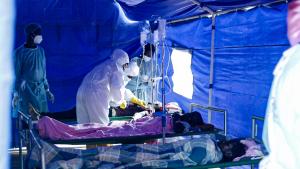From Crisis to Coordination: How the Response to Cholera is Saving Lives
This opinion piece was first published in Jornal de Angola, a copy of which can be found here: https://www.jornaldeangola.ao/noticias/9/opini%C3%A3o/644043/da-crise-%C3%A0-coordena%C3%A7%C3%A3o:-como-a-resposta-%C3%A0-c%C3%B3lera-est%C3%A1-a-salvar-vidas-
By Dr Indrajit Hazarika, WHO Representative in Angola
What happens when an outbreak threatens thousands of lives? How can a country turn a health crisis into an opportunity to strengthen its health system? And, above all, what is at stake when we talk about cholera in Angola?
Since January 2025, Angola has been facing one of the most serious cholera outbreaks in recent decades. More than 27,000 cases have been reported, and more than 760 people have died from cholera. Behind these numbers are faces, families, and entire communities affected. This is the case of Maria, a mother from the province of Cuanza Sul who, at night, travelled long distances with her twin children on her back and in her arms, looking for treatment. Thanks to the rapid activation of a local Treatment Unit, Maria’s children survived.
However, how many other desperate parents were unable to arrive in time to save their loved ones? Faced with this reality, the national response was immediate and coordinated. The Angolan Ministry of Health, with technical, financial and logistical support from the WHO and partners such as UNICEF, the World Bank, the European Union (EU), the UN Central Response Fund, Médecins Sans Frontières, CDC Africa, the Red Cross, CUAMM, World Vision, as well as medical emergency teams from the United Kingdom, Germany and Portugal, led an unprecedented multisectoral mobilisation. But what made this response effective?
The answer lies in leadership, coordination, and an evidence-based response. Multisectoral response groups were set up, with the participation of various state institutions and partners, and decisions were made based on concrete data: daily updated risk maps, real-time epidemiological and laboratory analyses, as well as daily and weekly newsletters that guided actions on the ground.
Cholera Treatment Centres and Community Units were activated and reinforced. Health professionals received training based on updated protocols. In addition, and perhaps more importantly, epidemiological surveillance was intensified in all priority provinces.
However, is the clinical response alone sufficient? The answer is no. Communication with communities was essential. Community Oral Rehydration Points were set up, educational materials were produced, and information was regularly disseminated in the media. Local leaders, including religious leaders, were also mobilised to promote preventive behaviours. Oral cholera vaccination campaigns were carried out in critical areas.
In addition, structural measures were implemented to address the root causes of cholera transmission. Access to safe drinking water was expanded with the installation of new safe water supply points, especially in peri-urban and rural areas. Community latrines were built, and intensive health education campaigns were promoted to reduce the practice of open defecation. Hand hygiene campaigns have been launched in schools, markets, and health centers, reinforcing the importance of simple but effective practices in preventing the disease.
Despite the progress made, challenges remain. How can access to safe drinking water be guaranteed in remote areas? How can the resistance of some communities to preventive measures be overcome? How can active surveillance be maintained in areas that are difficult to access?
At this moment of hope, with a significant decrease in the number of cases and the fatality rate — which fell from 8.8% in January to 1.5% in June — it is crucial to stop and reflect: What else needs to be done to end cholera in Angola? And what needs to be done to prevent it from recurring?
The answer lies in strengthening the health system. It is necessary to reinforce multisectoral work at all levels, ensure adequate and flexible funding for a rapid response, invest in infrastructure, particularly basic sanitation, hand hygiene, the use of latrines and the elimination of open defecation, strengthening community involvement and participation in prevention, preparedness, and emergency
response, investing in the continuous training of health professionals, robust information systems and rapid response networks. Because the next emergency may not be cholera, but preparation must begin now.
The World Health Organisation reaffirms its commitment to the Angolan people. We will continue to support national efforts to build a more resilient, inclusive, and prepared health system. Because every life saved today is a collective victory, and the health of a nation begins with its ability to protect its citizens, even in the most difficult times.
And that is why we make a clear appeal here: that everyone — government, partners, the private sector, civil society, the media, community leaders, and citizens — come together to end cholera in Angola. May this response not only be a victory over an epidemic, but a lasting commitment to health, dignity, and life.
